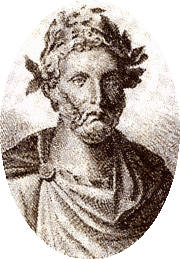Amy Richlin
Amy Ellen Richlin (born December 12, 1951) is a professor in the Department of Classics at the University of California Los Angeles (UCLA). Her specialist areas include Latin literature, the history of sexuality, and feminist theory.[1]
Amy Richlin | |
|---|---|
| Born | Amy Ellen Richlin December 12, 1951 |
| Years active | 1977–present |
| Known for | Classics writer and professor |
Early life
Born in Hackensack, New Jersey on December 12, 1951, to parents Samuel Richlin and Sylvia Richlin, her grandparents all immigrated to the US from Lithuania and Belarus. Neither of her parents were in the classic field with her father pursuing careers in music, poetry and butchery and her mother being a typist and secretary, most notably to Manie Sacks.
Academic career
Richlin studied at Smith College, then transferred to Princeton University in 1970,[2] graduating in 1973 as part of the first co-ed class to study there, where she then went on to found The Princeton University Women's Crew and then studied for her PhD at Yale University writing her dissertation on "Sexual Terms and Themes in Roman Satire and Related Genres".[3] Since 1977, she has taught at Rutgers University (1977–1979), Dartmouth College (1979–1982), Lehigh University (1982–1989), and the University of Southern California (1989–2005), before moving to the University of California at Los Angeles.[4] She retired from the University of California at Los Angeles after 45 years of teaching in 2022. [5]
Published works
Her first book was The Garden of Priapus: Sexuality and Aggression in Roman Humor (1983; rev 1992).[6] She developed the theme in collected works including Pornography and Representation in Greece and Rome (1992), and Feminist Theory and the Classics (co-edited with Nancy Sorkin Rabinowitz, 1993).[1][7] She has publicly cited Australian classical scholar Suzanne Dixon as a great influence in shaping her work on gender politics.[8] Richlin was the first to publish the word 'fuck' in the journal Classical Philology.[9][10]

In Rome and the Mysterious Orient, Richlin translated three works – Curculio, Persa and Poenulus – by the Roman playwright Plautus (notably using "references taken right out of American pop culture" to make Plautus more understandable to modern audiences).[11][12] For example, the conventionally translated text:
The lover that first set out on the highways of love with an empty purse went in for harder labours than Hercules
was translated by Richlin as:
The dude who first set out to go on the road of love without no dough, / this guy had to go through way more shit than all them Labors of Hercules."[12]
Her translation of Plautus' Rudens was adapted in a play Tug of War performed at the Getty Villa in 2007.[7][13]
Richlin also engaged on a long-term project on the amatory letters of the young Marcus Aurelius and his teacher, Cornelius Fronto,[1] with Marcus Aurelius in Love published in 2007.[7]
Awards and achievements
- ACLS Travel Grant (1987)
- National Endowment for the Humanities Fellowship (1987-1988)
- Women's Classical Caucus Prize (1992)
- Mortar Board Faculty of the Month (September, 1995)
- USC Associate Award for Excellence in Teaching (1996)
- ACLS Fellowship (2003-2004)
- Visiting Membership of High Table, Newnham College, Cambridge (2004)
- Loeb Foundation Fellowship (2010-2011)
- Lambda Classical Caucus Rehak Award (2011)
- Women's Classical Caucus Leadership Award (2017)
References
- "Amy Richlin". Department of Classics, UCLA. Retrieved 23 January 2017.
- Wyles, Rosie; Hall, Edith (2016). Women Classical Scholars: Unsealing the Fountain from the Renaissance to Jacqueline de Romilly. Oxford University Press. p. 274. ISBN 9780198725206.
- Richlin, Amy (2014). Arguments with Silence: Writing the History of Roman Women. University of Michigan Press. p. 17. ISBN 978-0472035922.
- "Amy Richlin CV" (PDF). UCLA. Retrieved 27 January 2017.
- "On Outgroups and Muted Groups: A Conference in Honor of Amy Richlin".
- Richlin, Amy (1992). The Garden of Priapus: Sexuality and Aggression in Roman Humor. Oxford University Press. ISBN 9780198023333.
- "The 2008 Spring Public Lecture Series". Institute for Antiquity and Christianity. Archived from the original on 25 April 2016. Retrieved 23 January 2017.
- Richlin, Amy (2013). Arguments with Silence. Ann Arbor: University of Michigan Press. p. 82.
- Richlin, Amy (January 1981). "The Meaning of Irrumare in Catullus and Martial". Classical Philology. 76: 40–46. doi:10.1086/366597. S2CID 162094918 – via Jstor.
- Calder III and Hallett, William M., and Judith P. (1996). "Introduction: Six North American Women Classicists". The Classical World. 90 (2/3): 83–96. doi:10.2307/4351923. JSTOR 4351923.
{{cite journal}}: CS1 maint: multiple names: authors list (link) - "UCLA classics professor spikes her version of the Roman Plautus with shots of American culture (1 June 2006)". History News Network. Retrieved 23 January 2017.
- Rome and the Mysterious Orient: Three Plays by Plautus, translated with introductions and notes. Berkeley: University of California Press, 2005. Pp. xiv, 288. ISBN 0-520-24274-2. (Bryn Mawr Classical Review 2006.05.35 by Vincent Hunink).
- Verini, Bob (7 September 2007). "Review: 'Tug of War'". Variety. Retrieved 23 January 2017.